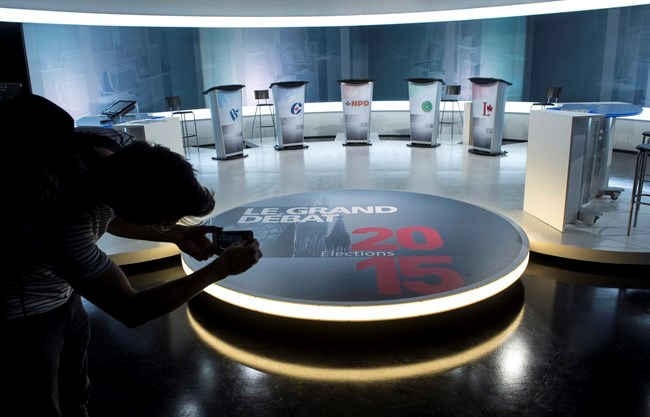OTTAWA — Here are five reasons for Canadians to watch for tonight’s French language debate, the third of five such showdowns before the Oct. 19 federal election.
The debate will be broadcast in French by Radio-Canada and live streamed online at ici.radio-canada.ca. Simultaneous English translations can be seen on CBC News Network and online at CBCNews.ca/CanadaVotes.
1. All five major party leaders will be on stage
This is the first time Green Leader Elizabeth May and the Bloc Quebecois Leader Gilles Duceppe will have the opportunity to reach a national audience. Both are potential spoilers for the three main leaders, Conservative Stephen Harper, New Democrat Tom Mulcair and Liberal Justin Trudeau. The Green and the Bloc leaders are positioned to be spoilers: Duceppe is aiming at the NDP, which is leading in Quebec, while May will target Harper. May believes that the last time she appeared in a major debate, in 2008, it may have helped limit Harper to a minority.
2. Hear some talk about ethics
Unlike last week’s debate on the economy or next week’s showdown on foreign affairs, the French format will allow for a wider variety of topics. It will be divided into five themes, one of which will focus on governance and democracy. The Mike Duffy trial has raised a series of questions about the power wielded by the unelected Harper staffers in the Prime Minister’s Office. In such a tight race, it will be worth hearing from Mulcair and Trudeau on how they would run things. The Greens want the PMO to be radically shrunk, and are making that a condition on supporting any of the other opposition parties in a minority House of Commons.
3. Hear some talk on the environment
From the Pope, to the U.S. president, to European leaders, there’s a big global push to take climate change more seriously, but it’s not exactly burning up the current federal election campaign trail. Harper says the focus should be on the economy and security, while Mulcair and Trudeau accuse him of neglecting climate change to the detriment of future generations and Canada’s current reputation in the world. The environment is expected to feature in one of the debate’s five segments. Look for May to make a strong showing here.
4. Quebec could decide the winner
Polls have been showing a tight, three-way race between the Conservatives, NDP and Liberals. The NDP won 59 of the 75 seats in the province in 2011, and are leading most polls in the province. However, the NDP lead might be soft. Quebec will play a major role in determining who wins on Oct. 19 with its 78 seats in an expanded 338-seat House of Commons. And there will be some core issues, specific to Quebec, for the leaders to debate tonight, including the divisive issue of face coverings at citizenship ceremonies, sovereignty and their positions on TransCanada’s Energy East Pipeline.
5. Look for signs of alliance
There’s an anyone-but-Harper movement afoot in this tight, three-way race. Mulcair and May said this week they wouldn’t support a Conservative minority government, joining Trudeau on that point. Harper may find some common ground with Duceppe, since both are on the same side of the niqab controversy, but that’s predicated on the Bloc leader pulling a Lazarus and actually winning a few more seats to make a difference. The leaders could face questions on this topic tonight, one of the few remaining chances to pin them all down at the same time on this important point.



